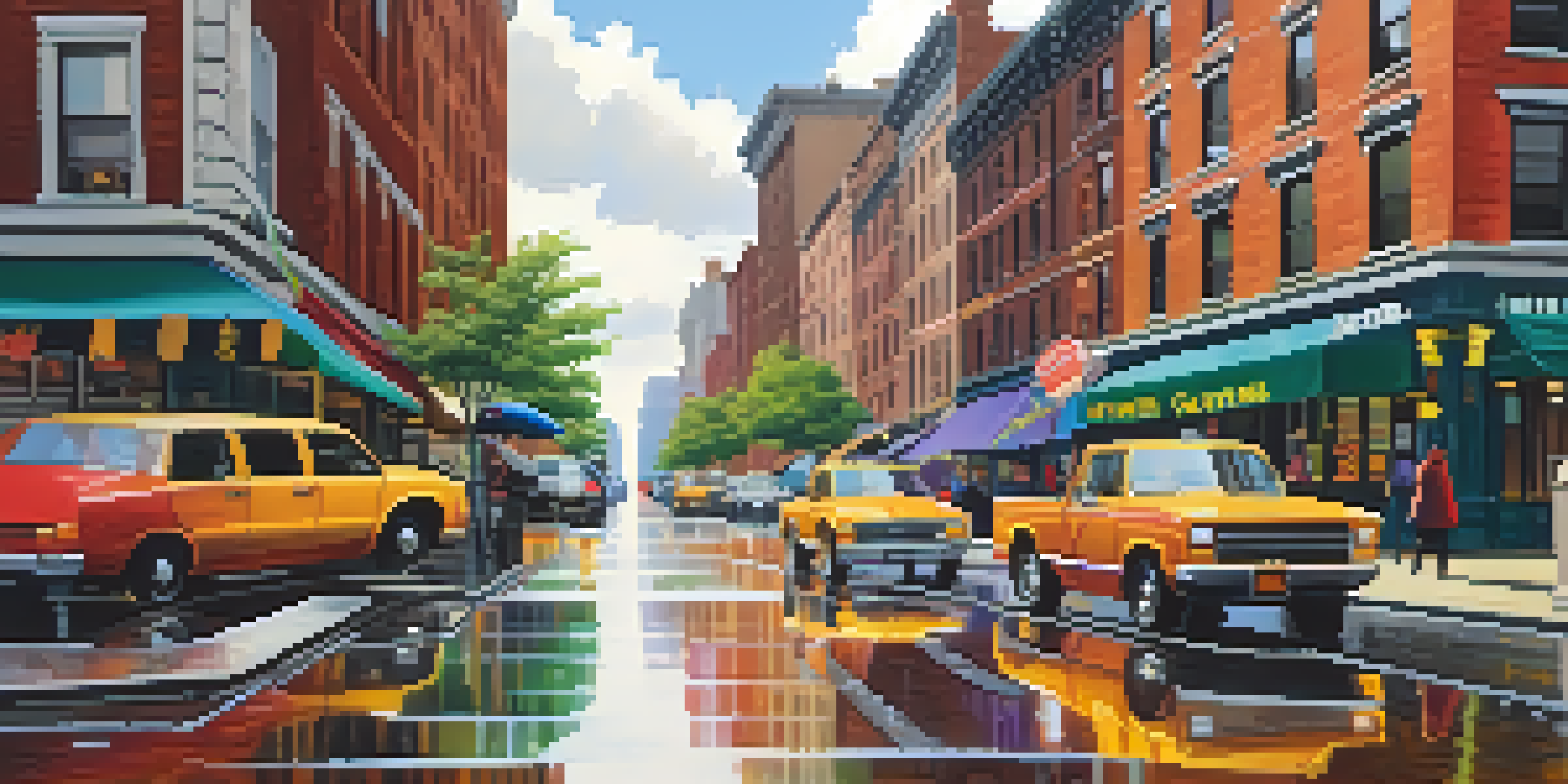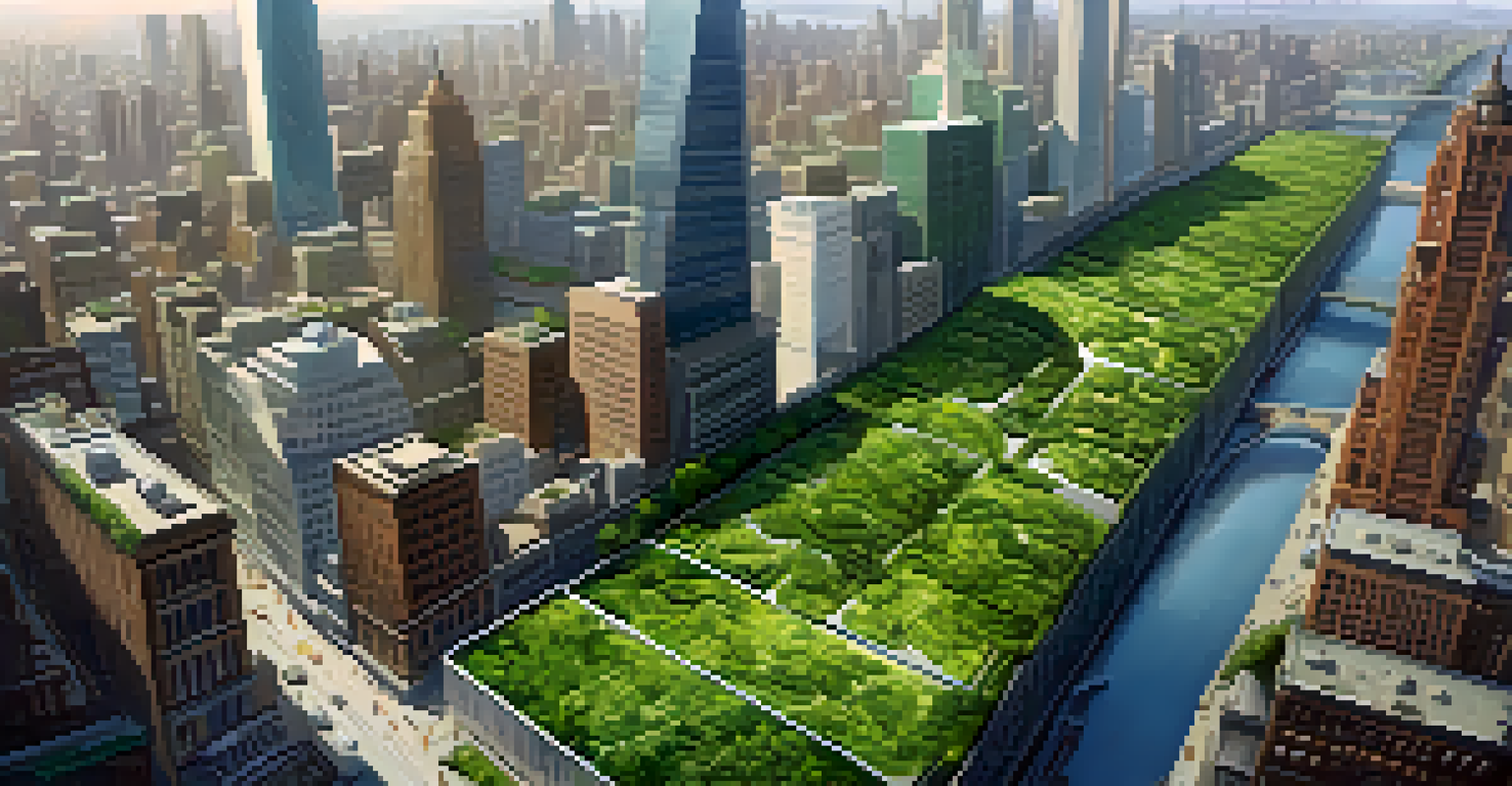Innovative Water Conservation Strategies in NYC

Understanding NYC's Water Supply Challenges
New York City relies on a vast and complex water supply system, drawing from reservoirs located upstate. With a growing population and climate change impacting weather patterns, the demand for water has never been more pressing. This means finding innovative solutions to conserve and manage this vital resource is crucial for the city’s sustainability. By addressing these challenges head-on, NYC can ensure a reliable water supply for generations to come.
We do not inherit the earth from our ancestors, we borrow it from our children.
Water conservation isn't just about saving water; it's also about preserving the environment. Urban areas like NYC face unique challenges, including runoff from impervious surfaces like roads and buildings. This runoff can contribute to pollution and waste, making it essential to implement strategies that capture and reuse water effectively. Understanding these complexities is the first step toward innovative solutions that benefit both the city and its residents.
As the city continues to evolve, its approach to water management must adapt as well. Urbanization and climate change are changing precipitation patterns, leading to both droughts and floods. By embracing innovative strategies, NYC can better manage its water resources, ensuring that the city remains resilient against future challenges while promoting sustainable practices.
Rainwater Harvesting: A Simple Yet Effective Solution
One of the most straightforward ways to conserve water is through rainwater harvesting. This method involves collecting and storing rainwater from rooftops and other surfaces for later use, such as irrigation or toilet flushing. Many NYC buildings are now equipped with systems designed to capture this precious resource, reducing dependence on the municipal supply. It's a practical solution that not only conserves water but also helps mitigate stormwater runoff.

Imagine a bustling city street where every drop of rain is captured and put to good use instead of flowing away into the sewer system. This is becoming a reality in NYC, where new regulations encourage the installation of rainwater harvesting systems. Homeowners and businesses alike are recognizing the dual benefits of these systems: saving money on water bills and contributing to a more sustainable city. As more residents adopt this practice, the cumulative impact can be significant.
Innovative Water Conservation Solutions
NYC is implementing strategies like rainwater harvesting and green infrastructure to effectively manage its water supply amid growing demand and climate challenges.
Rainwater harvesting is not just about technology; it's about mindset. By valuing every drop of water, residents can foster a culture of conservation that extends beyond their own properties. Educational programs and community initiatives can further promote awareness and encourage collective action, making rainwater harvesting an integral part of NYC's water conservation strategy.
Green Infrastructure: Nature Meets Urban Design
Green infrastructure is revolutionizing how cities manage stormwater. In NYC, this approach includes features like green roofs, permeable pavements, and bioswales that absorb rainwater and reduce runoff. These designs not only help to conserve water but also enhance urban aesthetics and provide habitats for local wildlife. By integrating nature into the urban landscape, NYC is reimagining how it interacts with water.
The greatest threat to our planet is the belief that someone else will save it.
For example, green roofs can reduce the heat island effect while simultaneously capturing rainwater. This innovative solution allows buildings to perform better in terms of energy efficiency and stormwater management. As more buildings adopt green roofs, the city can significantly alleviate pressure on its drainage systems during heavy rains, ultimately leading to fewer flooding incidents.
Furthermore, green infrastructure encourages community engagement. Local residents can participate in creating and maintaining these green spaces, fostering a sense of ownership and pride. This connection between people and nature not only enhances the environment but also promotes social cohesion, making cities like NYC more livable and sustainable.
Smart Water Management Technologies in NYC
Technology plays a pivotal role in modern water conservation efforts. NYC is leveraging smart water management systems that use sensors and data analytics to monitor water usage in real-time. This technology allows for more efficient distribution and reduces waste by identifying leaks or inefficiencies in the system. By utilizing data, the city can make informed decisions about where to focus conservation efforts.
Imagine receiving alerts on your smartphone about your water usage patterns, enabling you to adjust your habits accordingly. This level of engagement empowers residents to take control of their water consumption, leading to more conscious choices. Smart meters and apps can help track water usage, making it easier for individuals and businesses to adopt conservation practices.
Community Engagement is Essential
Active community involvement and education are crucial for promoting sustainable water practices and ensuring the success of conservation initiatives in NYC.
As NYC continues to invest in technology, the potential for innovation is enormous. From predictive analytics that forecast demand to automated irrigation systems that only water when necessary, the possibilities are vast. By embracing these advancements, NYC can not only conserve water but also set an example for other cities to follow.
Community Engagement: The Key to Successful Conservation
Community involvement is essential for the success of any water conservation strategy. NYC has initiated various programs to educate residents about water conservation practices and encourage participation. Workshops, events, and online resources provide valuable information on how individuals can make a difference in their daily lives. When communities come together, they can create a powerful impact on water conservation efforts.
For instance, neighborhood clean-up events often include educational components that inform participants about the importance of keeping our waterways clean. By raising awareness about the connection between pollution and water use, residents are more likely to adopt sustainable habits. This grassroots approach fosters a sense of responsibility and collective action that amplifies the effects of conservation initiatives.
Moreover, engaging communities in decision-making processes can lead to more tailored and effective solutions. When residents feel their voices are heard, they are more likely to support and actively participate in conservation programs. By building strong community ties, NYC can cultivate a culture of conservation that lasts long into the future.
The Role of Policy in Water Conservation
Effective policies are fundamental to successful water conservation in NYC. The city government has implemented a range of regulations and incentives aimed at promoting sustainable water practices. From requiring green infrastructure in new developments to offering rebates for water-efficient fixtures, these policies create a framework that encourages conservation at every level. Policymaking can drive change and motivate both businesses and residents to prioritize water sustainability.
For example, NYC's Department of Environmental Protection has introduced programs that reward property owners for reducing water consumption. These incentives not only make conservation financially appealing but also reinforce the importance of sustainable practices. Policies that support water conservation can create a ripple effect, encouraging others to follow suit and adopt similar practices.
Policies Drive Sustainable Practices
Effective city policies and incentives are vital in encouraging both residents and businesses to adopt water-efficient practices, reinforcing the importance of conservation.
As the challenges related to water scarcity and climate change grow, it becomes increasingly important for city leaders to advocate for progressive water policies. By prioritizing sustainability in legislative agendas, NYC can ensure that water conservation remains a top priority. Together, informed policies and community engagement can pave the way for a more water-conscious future.
Future Prospects: NYC's Path Toward Sustainable Water Use
Looking ahead, NYC is committed to furthering its water conservation efforts. The city is exploring innovative technologies and practices that will enhance its resilience against climate change and population growth. By investing in research and development, NYC aims to stay at the forefront of water management strategies. This proactive approach not only prepares the city for future challenges but also positions it as a leader in sustainable practices.
Collaboration with academic institutions and private organizations can lead to groundbreaking solutions tailored to urban environments. For example, pilot programs testing new filtration systems or water reuse technologies can provide valuable insights into best practices. By embracing a culture of innovation, NYC can continuously improve its water conservation strategies and adapt to changing circumstances.

Ultimately, the path toward sustainable water use in NYC lies in the hands of its residents and leaders alike. By fostering a shared commitment to conserving this vital resource, NYC can create a more sustainable and resilient city for future generations. The journey may be complex, but with collective effort, the goal of a water-smart city is well within reach.